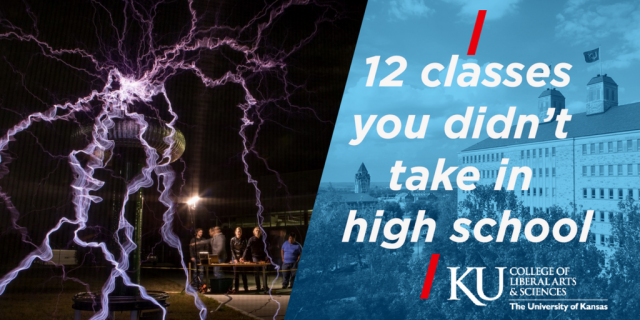High school provides a great foundation of education. But now that you’re at KU, it’s time to explore – and there’s no better place than in the College of Liberal Arts & Sciences. With more than 55 departments, programs and centers; 40 languages; and 100 major and minor options – chances are we’ve got what you’re looking for. Check out this list and visit college.ku.edu to discover new subjects and find your future.
SPLH 120: Speech-Language-Hearing – The Physics of Speech
It’s not about what you said, but how you said it. This course is an introduction to the physical characteristics of speech. You’ll learn about simple harmonic motion, the propagation of sound waves, aerodynamic aspects of vocal fold vibration, resonance, digital speech processing, frequency analysis, speech synthesis – and what all these words mean.
Also listed as LING 120. Prerequisite: MATH 101 or 104 or equivalent.
ATMO 105: Atmospheric Science – Introductory Meteorology
We don’t do metaphors here – explore what is literally in the air. This course is a lecture and lab combination introducing the atmosphere, weather and climate phenomena. Topics covered include: the structure of the atmosphere, energy and energy budgets, climate and climate change, air pollution, clouds and precipitation, pressure and wind systems, severe weather, and weather forecasting.
SOC 104 – Elements of Sociology

Do you belong with the plastics, varsity jocks or desperate wannabes? In this course you’ll study social life, including how human groups are organized, how they change, and how they influence individuals.
HA 100 – Intro to Western Art History
This art is #flawless. Study major historical and cultural developments, analyze key art works and monuments, and discover basic art historical principles and analytical methods. You’ll survey Western art and architecture, including the ancient Near East, Europe from antiquity to the present, and North America from the colonial period to the present.
ASTR 191 – Contemporary Astronomy
Study the structure and evolution of the universe, from nearby planets to quasars far, far away. Topics include recent discoveries concerning planets, stars, pulsars and black holes as well as their evolution, the structure of the universe today and how it will be in the future.
REL 104 – Introduction to Religious Studies
Religions have been and remain among the most powerful forces shaping human history. They are central to understanding both what divides us and unites us. You’ll be introduced to the academic study of religions, examining key methods and issues in religious studies, without seeking to promote or disprove any specific belief system. The skills that religious studies students gain in critical thinking and cultural awareness have led them to successes in a wide array of career fields, including education, law, journalism, healthcare, chaplaincy, and social justice advocacy.
WGSS 101 – Intro to Women, Gender & Sexuality Studies
Study the role gender plays in life, power relations and within economic, political, educational and other social structures. You’ll also examine and explore alternatives to traditional constructions of gender and sexuality, and consider other markers of difference, such as disability, race, class, and religion, which intersect with gender identity and sexual identity.
LING 106 – Introductory Linguistics
What is linguistics anyway? It’s all about language. In this course you’ll learn the fundamentals of linguistics; the sound system, grammatical structure and semantic structure of languages. How language changes and affects a specific culture and society. Students will also learn techniques of linguistic analysis in a variety of languages including English. Also listed as ANTH 106.
FMS 100 – Introduction to the Film Medium
You’ll study film not just as entertainment, but as a visual art. Analyze selected films reading signs, syntax and structure of cinematic language focusing on communication between film viewer and film maker. J.J. Abrams will be so proud.
GEOL 101 – Geology: The way the Earth works
Hank Schrader knows the difference between minerals and rocks. Do you? In this course you’ll be introduced to the principles of Earth science, studying the structure of minerals and rocks; action of streams, oceans, glaciers, volcanism, earthquakes, and plate tectonics. You’ll also discuss earth processes in the context of sustainable energy, environmental concerns, climate and other topical issues.
This course with GEOL 103 satisfies the College laboratory science requirement.
SLAV 148 – Introduction to Slavic Folklore
In high school, you probably had the opportunity to study a few different cultures and languages. Now that you’re at KU, you can study more than 40 languages and cultures – just like Russian nesting dolls, the opportunities keep coming. This course is an introduction to the various forms of folklore among the Slavic peoples, with particular emphasis on the folk literature, customs, and artifacts.
Satisfies Goal 4 Outcome 2 & Goal 3 Arts and Humanities in the KU Core.
In high school, you probably had the opportunity to study a few different cultures and languages. Now that you’re at KU, you can study more than 40 languages and cultures – just like Russian nesting dolls, the opportunities keep coming. This course is an introduction to the principal achievements of Russian cultural history, with particular emphasis on literature, folklore, spirituality, and the visual arts.
ANTH 100 – General Anthropology
Anthropology = study of people. This course will introduce students to the discipline of Anthropology, specifically human diversity in the past, present, and future. Students will investigate such questions as: How did humans evolve? How have human cultures and languages developed? What tools, technologies, and new kinds of knowledge and expertise emerge in the face of global environmental, social, political, and economic change?
Note: These classes are offered across all semesters. Check out the schedule of classes to see what’s available in upcoming semesters.











